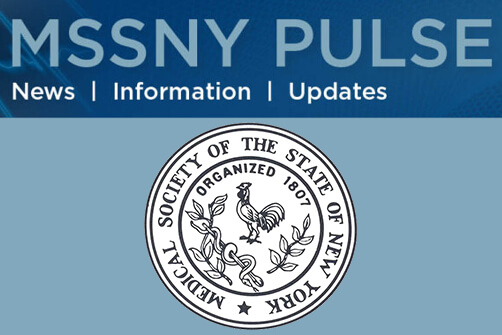
State Budget Takes Steps to Protect Patient Access to Community-Based Physician Care
The final State Budget that passed over the weekend contains the following notable positive outcomes for physicians and the patients they treat:
- Continues for an additional 2 years the law supported by MSSNY that requires health insurers to pay for telehealth delivered services at a level equal to comparable in-person delivered services.
- Does not include an Executive Budget proposal strongly opposed by MSSNY that would have removed authorization and funding for MSSNY’s Committee for Physicians Health.
- Does not include an Executive Budget proposal strongly opposed by MSSNY that would have imposed a 50% cost share on the 16,000 physicians who receive Excess Medical Malpractice Insurance coverage.
- Does not include an Executive Budget proposal strongly opposed by MSSNY that would have prohibited physicians from appealing underpayments from Medicaid Managed Care plans to Independent Dispute Resolution (IDR).
- Does not include an Executive Budget proposal strongly opposed by MSSNY that would have permitted Physician Assistants to practice without physician supervision or collaboration.
- Does not include an Executive Budget proposal strongly opposed by MSSNY that would have increased prior authorization requirements for prescriptions for patients covered by Medicaid.
- Does not include a proposal in Budget negotiations strongly opposed by MSSNY that would have expanded liability costs by expanding damages awardable in wrongful death actions.
- Ensures “continuous” Medicaid/CHIP insurance coverage for a child under the age of 6.
- Provides another $100,000 to MSSNY to continue physician education programming through the Veterans Mental Health Initiative
- Continues the expanded funding for the Doctors Across New York medical student loan repayment program (which was increased by 75% in 2022-23 Budget)
Physicians should be aware of some of the measures that are part of the final enacted Budget that will have an impact on physician practice, including:
- revisions to Medicaid reimbursement for office-administered medications such that the State will reimburse the physician office the lower of: 1) the actual cost to the practitioner 2) the wholesale acquisition cost as set by CMS 3) the federal upper limit, if any, established by CMS; or 4) the state maximum acquisition cost, if any.
- As part of a medical debt reform package, there are new requirements for all healthcare providers to obtain consents from patients to be billed for healthcare services that is separate from the consent for treatment, as well as more detailed requirement regarding the use of medical credit cards.
We would like to thank all the physicians who answered our call throughout the last several months to make a phone call, send a letter or tweet at their legislators and the Governor on many of these issues. And a special thank you to all physicians who took the time to come to Albany last month for our Advocacy Day. All of these efforts were major contributing factors to the Legislature holding firm to oppose many of the adverse provisions that had been included in the Executive Budget.
Given the thousands of pages of State Budget documents, we will continue to provide additional details on items of importance to physicians.
Share
Registration Now Open Medical Matters CME Webinar Public Health! What is it Good for? Wednesday June 12, 2024 @ 7:30am Join a group of public health experts on June 12th at 7:30am for the next Medical Matters webinar, Public Health! What is it Good for? This webinar will be a panel discussion examining the evolving […]
Revised Wrongful Death Liability Expansion Legislation Does Not Alter Fundamental Concerns About Harm to Healthcare System New York’s continued designation as one of the worst states in the country in which to be a physician Best & Worst States for Doctors in 2024 (wallethub.com) is a major contributing factor to patient access to care shortages […]
MSSNY Joins with Patient Advocates to Reduce Prior Authorizations Burdens MSSNY organized meetings with several key legislators this past week to urge passage of prior authorization reform measures this year, including A.7268 (Weprin)/S.3400 (Breslin) and A859-A(McDonald)/S.2680-A (Breslin). Joining MSSNY in these meetings were representatives from the NY State Psychiatric Association, the American College of Obstetricians […]
Final Weeks of Session Brings Numerous Concerning Scope Expansion Bills The recently enacted State Budget importantly rejected numerous proposals that would have threatened patient safety by removing the important oversight and/or collaboration that physicians provide in the delivery of patient care. However, as we enter the final three weeks of the scheduled 2024 Legislative Session, […]





